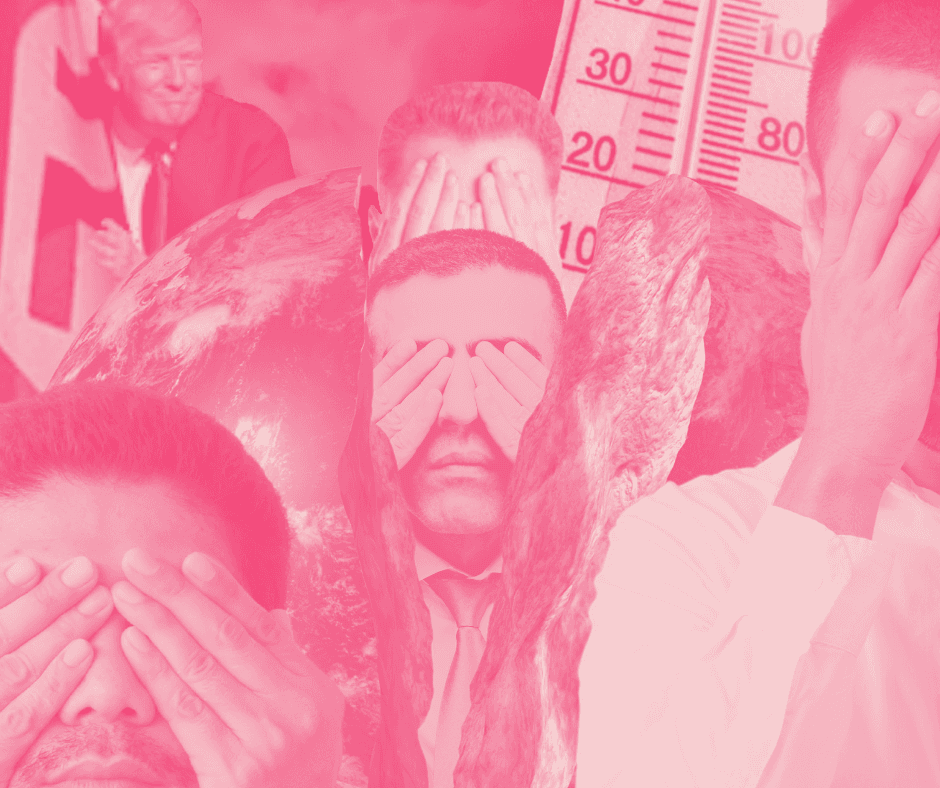

In the second part of this special edition podcast, Change Oracle’s Richard Matthews discusses the logic of inaction with Tom Schuneman, the owner of the Planet Watch Group and Editor of Global Warming Is Real. They explain that the crises we face, are attributable to a system that is rife with broken assumptions. They argue that disinformation is the logical outgrowth of such a system.
This deep dive into the systemic failures driving our inability to address the interconnected global crises focuses on the ways that we have inadvertently inculcated world views that are disconnected from reality. Richard and Tom discuss the psychology of inaction and attempt to deconstruct the logic that causes society to prioritize profit over human welfare and the health of the biosphere. They argue that deeply rooted structural flaws in the ways we organize the world keep us from apprehending the issues and prevent us from acting.
We fail to realize that we have been enslaved by an economy that is destroying the biosphere and eroding the social fabric. We serve the economy instead of making the economy serve humanity. We are blinded by economic pre-eminence when it should be obvious that without the natural world, there is no economy. The failure to acknowledge these basic facts, despite a plethora of ominous warnings, is either a form of mass psychosis or collective suicide.
They specifically explore how the combination of disinformation and broken assumptions thwart effective action on critical issues. They drill down on the mechanics of feedback loops in a diverse array of crises ranging from climate change to food insecurity and the rise of authoritarianism. They also examine how these dynamics are at play in the recent wars in Ukraine and Palestine as well as events in Somalia, Haiti, the Horn of Africa, and the Sahel.
The polycrisis and vicious cycles
Crises are interconnected, and feedback loops form within and between these crises creating vicious cycles. The rise of authoritarianism illustrates the point. Technological and economic changes have contributed to an identity crisis that has led to a resurgence of right-wing extremism. This was exacerbated by Russia’s war in Ukraine which drove an inflationary spiral, that contributed to increased social unrest resulting in political dysfunction. These relationships transcend traditional economic, social, and technological distinctions.
Dissecting these interrelationships is key to crafting effective strategic responses. Understanding these complex relationships is critical because even well-intentioned efforts can have negative impacts. So, for example, curtailing ocean pollution and alleviating poverty appear to be entirely laudable, but they each have unwanted adverse corollaries. Studying these complex interactions has profound implications for our efforts to maximize benefits and minimize ancillary harms.
Managing information overload
Policymakers and the public are overwhelmed by the firehose of information. We do not understand the ways issues are coalescing because we do not have the bandwidth to interpret the plethora of data. In a world awash with data, we don’t know what is real. This makes people vulnerable to disinformation and to demagogues who promise they can fix everything.
To achieve key objectives and assess potential risks, policymakers need access to the most relevant and crucial information and analysis. They need collated data presented in a readily comprehensible format. Centralizing, simplifying, and prioritizing critical information using technologies like AI can help us make sense of all the data. We can also take advantage of the immense computational potential of cloud computing to democratize the process and make such analyses more accessible.
We need to study these complex interrelationships to transform the wealth of data into actionable intelligence. In governance parlance, putting together the most important information needed to make intelligence-based decisions, is referred to as Priority Intelligence Requirements (PIRs). PIRs respond to the needs of policymakers, including needs they may not know they have.
In the absence of a receptive audience, the best PIRs are doomed to fall on deaf ears. Bridging the gulf between science, the public and policymakers is about more than information. To help people to embrace constructive solutions we must first understand the reasons why we fail to apprehend the reality of the threats we face.
Disinformation and structural flaws
This delusional thinking is perpetuated by those who have a vested interest in distracting us and skewing our understanding of the world. They mold our reality with the help of lobby groups and public relations firms that specialize in disseminating fiction.
The fossil fuel industry is at the forefront of efforts to leverage the power of lies. They use their economic might to create sophisticated multi-tiered disinformation campaigns that deceive people and shelter their business models from accountability. They manipulate public perceptions and policymaking to maintain power. They shape legislation and spew disinformation using powerful front groups like ALEC and API.
The fossil fuel industry’s long history of sewing doubt and casting aspersions on good science is a matter of public record. This includes efforts to misinform kids in public schools and control research in academic institutions.
They also use their immense wealth to buy legislators and dictate political outcomes. Politicians serve the interests of the old energy industry and in the US, Republicans are the leading purveyors of fossil fuel disinformation.
The unholy alliance between the government and the oil and gas industry has proven to be tremendously effective. However, this compact belies the fact that there is no future in a world powered by fossil fuels. Nonetheless, there is an internal logic driving their planetary destruction. The oil industry’s primary goal is to maximize profits, so they have multi-trillion-dollar incentives to rig the game.
When Big Oil amasses ungodly sums from poisoning the planet, when it lies, and subverts the rules of the game, it is simply following market dictates. Manipulation that maximizes profits is part of the industrialist’s playbook. They sew disinformation and bend the knee before dictators because they have a fiduciary duty to deliver profits.
The problem is deeper than industry and government, the problem is a system that incentivizes systemic manipulation and rewards malfeasance. This is a system that has spawned multiple crises including biophysical deterioration, rampant inequality, and social dysfunction. Yet we fail to see because we have been absorbed into a worldview that frames what we know and limits our understanding.
Challenging broken assumptions
We have unwittingly inculcated a series of fundamental beliefs that are disconnected from reality. There is no better illustration of the reality-defying preoccupation of our assumptions than our myopic obsession with profits and economic growth. Despite blaring warnings, many refuse to acknowledge that market primacy threatens the biosphere upon which our economy depends.
Broken assumptions structure our awareness and shape our reality through regimes of discipline that compel conformity without our conscious consent. The influence these misguided beliefs have over us is both pernicious and pervasive. Our thinking is steeped in broken assumptions, and they have insinuated themselves into every aspect of our lives including many well-intentioned solutions.
Our economy, our politics, and our culture feed us a steady stream of broken assumptions, locking us into a worldview that causes us to misperceive reality. The purveyors of disinformation reinforce and leverage the misperceptions that arise from these broken assumptions to control the game so that they can amass more power and wealth.
Many of our fundamental assumptions are rooted in classical economics. Even though these assumptions have spawned multiple crises, they are rarely challenged. Those who do challenge these assumptions are dismissed as socialists.
Deprogramming
Addressing the crises we face is about more than exposing lies and presenting a fact-based counter-narrative. We need to address the indoctrination and conditioning that obscures our conception of reality preventing us from apprehending and attending to the facts.
Despite all the evidence, we cannot seem to understand that in the process of destroying the natural world, we are destroying ourselves. This is a function of the broken mindset that is imposed upon us from birth. We do not challenge the status quo A lot because we have been propagandized.
We need to see the issues before we will address them. To conceive of effective solutions, we need to divest ourselves of ingrained beliefs. Like the victims of a cult, we need to deconstruct our thinking and ferret out the flawed assumptions derived from a broken economic system.
Questions and the path-forward
Asking questions may be the best way to begin the process of deprogramming. This is not about being didactic, it is meeting people where they are and encouraging them to think. It can be as simple as asking someone to consider why they believe something to be true. Questions are like seeds, even if the soil is less than receptive, they can sometimes take root.
Reflecting on the veracity of our beliefs can help us to see the issues more clearly. This can be the start of a process that leads people to question the assumptions that undergird a system that is leading us inexorably to ruin.
To address the polycrisis, we need to craft multifaceted interventions that maximize benefits while minimizing side effects. But we cannot do this as long as we are beholden to an indoctrinated mindset that skews our understanding of key issues.
Addressing deeply embedded misperceptions exponentially enhances our ability to prioritize solutions that reflect the complexity of the polycrisis. Examining our assumptions and challenging their veracity also makes room for good assumptions, upon which effective solutions depend. To move beyond the prevailing paradigm, we need to deconstruct our reality so that we have the space to imagine something better.
To listen to the podcast click here.
For more information go to Change Oracle’s Polycrisis Project
Related
Discover more from Change Oracle
Subscribe to get the latest posts sent to your email.








